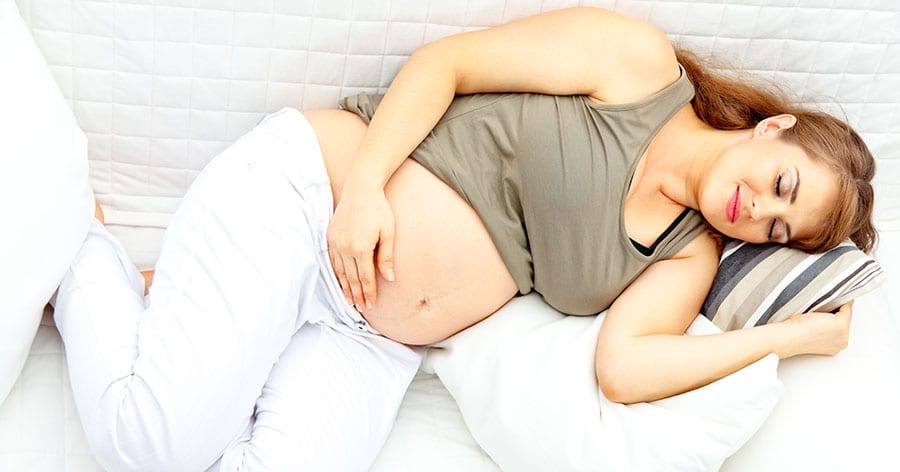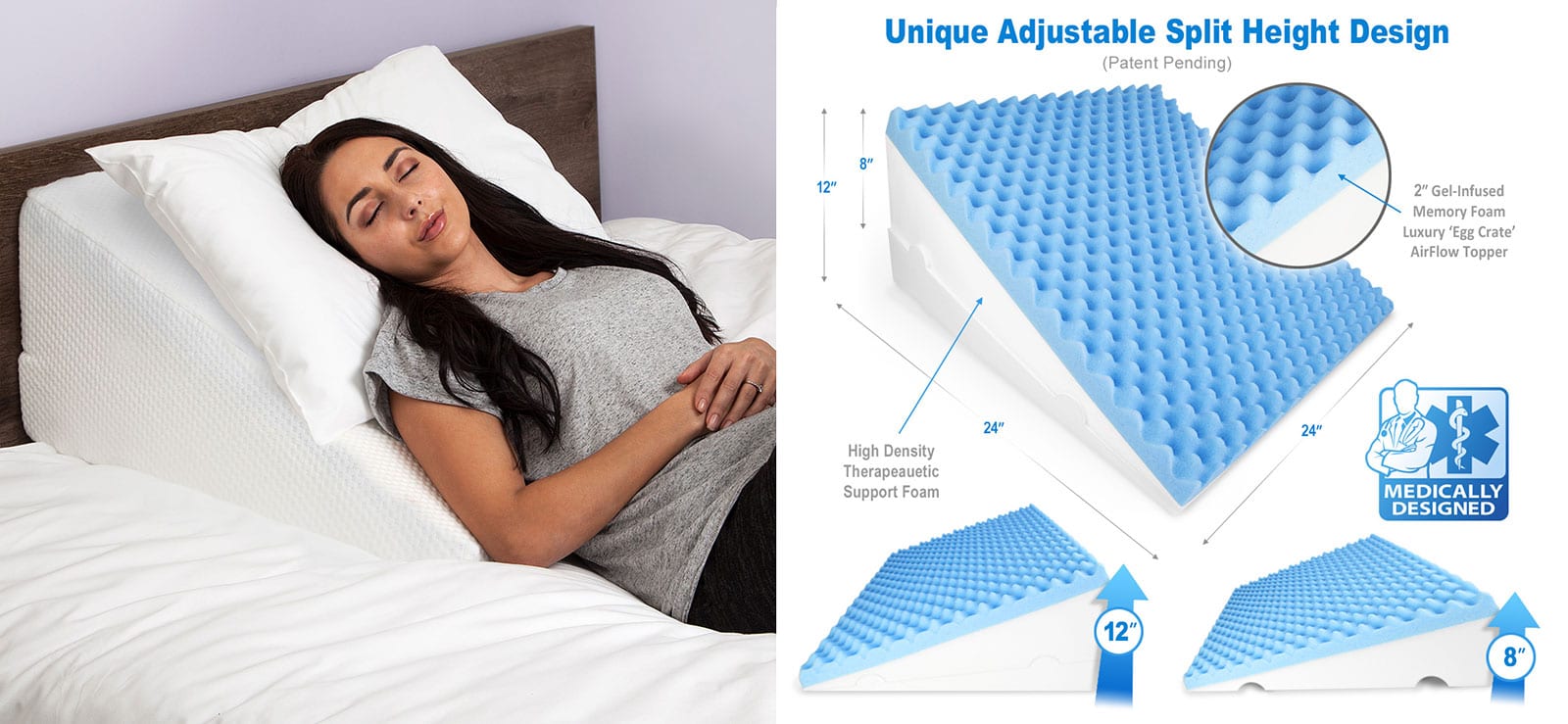Pregnancy Insomnia – How to Get a Good Night’s Sleep when Pregnant
All expectant parents realize that once their new baby has arrived, they are likely to experience interrupted sleep for months to come. But for most women, pregnancy insomnia starts a long time before the birth. At a time when your body is working hard to create your new baby, it is more important than ever that you get a good night’s sleep. But sleeping when pregnant can often be challenging.
Why is Sleep so important when Pregnant?
We all know that sleep allows our body the time to rest, repair and reset itself, so we can continue to be active the following day. However, when pregnant, this rest time is even more important than usual, as your body is working extra hard 24 hours a day! Sleep is one of the main allies that help keep our immune system in good order. Because our immune response system becomes depleted when pregnant, getting a good night’s sleep becomes even more important to give it a boost. This is also when the vascular system (blood vessels) repair themselves, which of course are working extra hard to maintain blood flow and therefore oxygen to your baby. If you become forgetful when pregnant (baby brain) then sleep helps to improve memory and allows you to function more normally the following day. Finally, sleep is important in regulating how your body reacts to insulin. Gestational diabetes, and the complications that this can cause, is a concern for all pregnant women. This occurs if insufficient insulin results in an elevation of blood sugar levels. Therefore, getting a great night sleep is important for all expectant mommas!

Why Can Sleeping When Pregnant Be So Difficult?
Difficulty sleeping when pregnant can be caused by several aspects of your changing body:
• Body Aches – as your body becomes stretched and organs moved by your growing baby then you will experience many aches and pains that are unique to being pregnant. These can be all over your body, but particularly focused in your pelvic, back, groin and legs. Any pain or discomfort we experience is enough to prevent our bodies form relaxing and getting a decent sleep.
• Leg Cramps – the agonizing squeeze you feel in your leg muscles that have you jumping around the bedroom in agony occur more frequently at night time and have increased occurrence in pregnant women. This is a result of a change in the way your body is able to processes calcium.
• Restless Leg Syndrome – According to NCBI research, the prevalence of restless leg syndrome is 2 to 3 times higher when compared to the general population. As this condition usual occurs when the legs are at rest, it is a frequent source of night disturbances in pregnant women.
• Elevated Heart Rate – As your body needs to supply more blood to your uterus, your heart rate increases during pregnancy as a result of the extra workload. Lowering our heart rate is usually one of the conditions that helps us to fall asleep, so if your heart is beating at a faster rate, sleeping can be more difficult.
• Heartburn – even if you have never experienced heartburn or acid reflux before you were pregnant, the chance of it occurring at some stage during pregnancy is high. The digestive system tends to work at a slower pace when pregnant and therefore food stays in the stomach for longer allowing more time for acid to occur. When laying down heartburn tends to be more noticeable than when standing as gravity works against you and allows acid to travel up your oesophagus.
• Shortness of Breath – In addition to pregnancy hormones causing you to breathe more deeply, as your baby grows and takes up more room, the diaphragm movement becomes restricted leading to less space for the lungs to expand.
• Bladder Issues – the need for pregnant women to go to the toilet more often is well known and this does not stop just because you are sleeping. It is widely assumed that this is due to baby pressing against your bladder creating the urge to empty it more frequently. However, the increased flow of blood is also at play. As your kidneys filter your blood, the increased blood flow makes your kidneys work harder, which in turn creates more urine.
Pregnancy Sleeping Positions
We all have our favored sleeping position which we adopt (consciously or not) every night. However, when pregnant, some positions are simply either not practical or unadvised to maintain optimum health. Let’s consider the best sleeping position during pregnancy for each trimester:
• First Trimester – early in the pregnancy the position you sleep in is not important as far as keeping yourself and baby healthy is concerned. This time is often characterized by extreme fatigue with moms to be often describing that they could fall asleep easily in any position. So whichever position you are used to, or feel most comfortable in, is fine. However, if you are a stomach sleeper you may want to begin to train yourself to sleep in a different position, so that when stomach sleeping becomes impossible you are not struggling with insomnia by trying to sleep in an unfamiliar way.
• Second Trimester – During this period, stomach sleeping will need to stop and side or back sleeping is preferred. If you have an older mattress, then now may be a wise time to switch it out for a new firmer one, to ensure it provides the support you will need when the extra weight of your baby starts to place more stress and strain on your body. Many doctors recommend side sleeping with your knees tucked up (similar to the fetal position). This position takes the pressure off your spine and is one of the most comfortable positions to sleep in when pregnant. However, it also has health benefits too. It helps your heart to function more effectively as it prevents the weight of the baby from pressing down on the main vein that carries blood from your legs and feet back to your heart (inferior vena cava). A benefit to mom and baby! If you are not a natural side sleeper then a Side Sleep Support Pillow can help you to train yourself to stay in that position without taking up too much space in the bed (a bug bear of the big U-shaped pillows that some people use).
If you can’t get to sleep on your side then sleeping on your back while pregnant is still possible. To ease the strain on your spine when sleeping on your back, trying sleeping in a gravity neutral position.



This involves elevating your upper torso with a Wedge Pillow and using another wedge pillow to hook your knees over with your legs resting on the downslope. This takes all the pressure off your spine and rounds your hips, helping to ease pregnancy aches and pains.
Choosing a wedge pillow with an adjustable height feature is useful so that you can gain the most comfortable height for you. Some also come with cooling egg crate memory foam which is a great aid for pregnancy flushes!
• Third Trimester – By the time you reach your third trimester, sleeping is likely to become uncomfortable and the sleeping position you choose becomes more important. In a study published in the Lancet medical journal in 2019, it was found that sleeping on your back after 28 weeks pregnant can slightly increase the risk of late pregnancy stillbirth (by 5.8%) Therefore the ‘SOS’ position (Sleep on Side) is generally recommended. Many doctors recommend sleeping on your left side as sleeping on your right puts more pressure on your liver and also makes your heart need to work harder. However, the Lancet study found no appreciable difference in sleeping left or right as long as you side sleep. When side sleeping in late pregnancy, the Side Sleep Support Pillow can provide your back with support, but many women benefit from using a Half Moon Bolster Pillow between their knees to provide support to the pelvic and hip areas. For those that really struggle to side sleep and can only sleep on their back, then sleep elevated with a Wedge Pillow. As previously described, this helps to take the pressure off your spine and will also help relieve another pregnancy side effect – heartburn!
Tips for Sleep Success in Pregnancy
As difficult as it is to sleep when heavily pregnant, you know once baby is born that sleep is gong to be interrupted even more. Therefore, take a look at our top tips for getting a good night’s sleep when pregnant:
• Reduce the volume of acid foods – heartburn or acid reflux affects many pregnant women, even those that have never experienced the condition before. Therefore, reducing the intake of acid-based foods such as citrus fruits can limit the amount of acid released and prevent it from keeping you awake at night.
• Routine – if you vary the time you go to sleep and wake up then your body’s natural circadian rhythm will be knocked off track. As your body is experiencing daily changes as you nurture your baby, keep your bed times consistent so that your body gets into the habit of going to sleep at the same time.
• Avoid exercise before bed – preparing our bodies for sleep is an important part of getting a good night’s sleep. Therefore, focus on yoga or meditation as part of your healthy bedtime routine rather than going for a walk or swim.
• Food and Drink – Avoid drinking a lot of fluid in the couple of hours before going to bed otherwise you are likely to be awoken during the night for a comfort break! Eating late at night also puts your digestive system into overdrive and is likely to disturb your sleep.
• Reduce the chance of Leg Cramps & Restless Leg Syndrome – Many pregnant women experience leg cramps or restless legs which frequently disturb sleep. Try to prevent these from happening by stretching legs before getting into bed, push feet against a wall and sleep with your ankles raised on a Half Moon Pillow to improve circulation.
• Healthy Breathing – it may sound obvious but creating a healthy environment for breathing is important when pregnant. As baby grows in the third trimester, many women experience some breathlessness as the diaphragm movement becomes restricted. Use fabrics and fillings that improve airflow when sleeping. Use support pillows that are made from egg crate memory foam as this allows a better circulation of air. Use pillow covers made of breathable fabric such as bamboo.
• Avoid Herbal Sleep Aids – after a couple of night’s poor sleep it is very tempting to reach for a herbal sleep aid readily available at the drug store. However, these are not recommended and should not be used when pregnant.
Lack of sleep can affect how well we function every day, but when pregnant it can have a greater impact. If this sleep deprivation is prolonged, there is evidence that this can prolong labors and increase the likelihood of a C section. If you are finding that sleep is becoming a problem over a number of nights then always seek expert advice from your healthcare practitioner.










